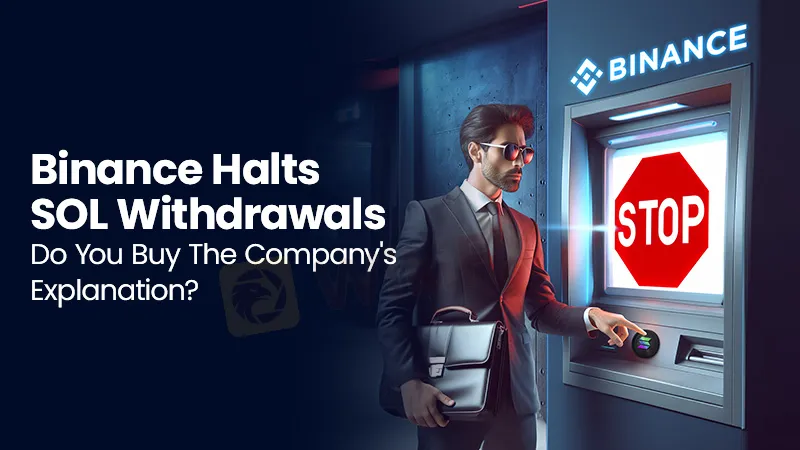简体中文
繁體中文
English
Pусский
日本語
ภาษาไทย
Tiếng Việt
Bahasa Indonesia
Español
हिन्दी
Filippiiniläinen
Français
Deutsch
Português
Türkçe
한국어
العربية
Binance Halts SOL Withdrawals | Do You Buy The Company's Explanation?
Abstract:Binance declared the periodic halting of withdrawals on the Solana (SOL) network starting from March 4, 2024, citing the decision as a response to increased transaction volumes causing congestion problems.

Responding to a recent market surge that attracted a higher number of investors and increased market participation, major exchanges, including Binance, are currently grappling with challenges. Binance, a prominent player in the field, faced issues leading to the intermittent suspension of withdrawals on the Solana (SOL) network as of March 4, 2024. This decision resulted from a notable increase in transaction volumes, causing congestion problems.

Acknowledging any inconvenience caused by this temporary suspension, Binance is dedicated to promptly resolving the matter. The exchange asserts that it has identified areas within the network infrastructure that need optimization for smoother operations. Active efforts are underway to address these concerns and ensure a stable and lasting solution to the withdrawal issues.
As per Binance's announcement, the targeted implementation date for this solution is March 9, 2024, at 18:00 (UTC), with the aim of minimizing disruptions and restoring normalcy to SOL withdrawals for Binance users.
In the context of Solana's native token SOL, it observed a slight decline of 0.68% in the past 24 hours but maintains an impressive growth of over 17% for the week. Recent disruptions on major exchanges like Binance and Coinbase are attributed to an upsurge in retail interest and increased activity from algorithmic trading firms.
Despite operational challenges, Binance received recognition in the form of the Cyber Security Professional Merit Award in the banking and finance category from Hong Kong authorities. This acknowledgment underscores the exchange's commitment to excellence in the financial landscape.

Disclaimer:
The views in this article only represent the author's personal views, and do not constitute investment advice on this platform. This platform does not guarantee the accuracy, completeness and timeliness of the information in the article, and will not be liable for any loss caused by the use of or reliance on the information in the article.
Read more

Common Tactics Used in Online Trading Fraud Today
Know the top online trading scams of 2025, from fake apps to pump-and-dump tricks. Simple tips to spot and avoid them, keeping your money safe in this easy guide.

Vanuatu Passes VASP Act to Regulate Crypto and Digital Assets
Vanuatu's new VASP Act regulates crypto businesses, enforcing strict licensing, AML/CFT compliance, and investor protections.

Blockchain Decentralization: Empowering a Trustless Future
In recent years, blockchain technology has rapidly evolved from a niche innovation behind Bitcoin into a transformative force across industries. At its core, blockchain decentralization refers to the distribution of authority and decision-making away from a central entity and into the hands of a distributed network of participants. This shift redefines how data is stored and verified and paves the way for trustless, transparent, and resilient systems that challenge traditional centralized models.

Why the SEC Rejected the First U.S. Bank-Issued Stablecoin
The SEC rejected the first U.S. bank-issued stablecoin, citing regulatory concerns. This decision highlights the ongoing challenges in crypto asset classification and oversight.
WikiFX Broker
Latest News
FCA Warns Against 10 Unlicensed or Clone Firms
CySEC Warns Against 14 Unlicensed Investment Websites
Top Currency Pairs to Watch for Profit This Week - March 31, 2025
Will natural disasters have an impact on the forex market?
Philippines Deports 29 Indonesians Linked to Online Scam Syndicate in Manila
Exposing the Top 5 Scam Brokers of March 2025: A Closer Look by WikiFX
Gold Prices Climb Again – Have Investors Seized the Opportunity?
Webull Launches SMSF Investment Platform with Zero Fees
Australian Regulator Warns of Money Laundering and Fraud Risks in Crypto ATMs
The Withdrawal Trap: How Scam Brokers Lure Victims into Paying More
Currency Calculator







